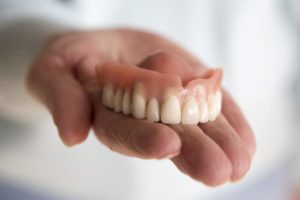1. Tooth decay is a chronic condition.
Although it’s preventable, 92% of adults have had at least one cavity in a permanent tooth. If you’re not experiencing any pain or sensitivity, you might assume your teeth are healthy, but 1 in 5 adults have untreated tooth decay. Cavities can be found early by visiting your dentist at least twice a year for a cleaning and checkup. You can safeguard your smile from cavity-causing bacteria at home by brushing, flossing, and limiting your sugar consumption.
2. Gum disease causes tooth loss.
Gum disease is a preventable infection caused by bacteria found in plaque and tartar buildup. The earliest stage, called gingivitis, causes red, swollen, and bleeding gums. It can be treated without causing long-term damage, but if it reaches advanced stages, you can lose your teeth. As the leading cause of tooth loss, you can preserve your natural smile by flossing at least once daily.
3. Your teeth may not last forever.
Your teeth are designed to last for a lifetime, but that doesn’t happen for many Americans. Despite the latest advancements in dentistry, 120 million adults have lost at least one tooth. 35 million Americans don’t have any teeth left in one or both arches. You can avoid the embarrassment and challenges of an incomplete smile by committing to your oral hygiene at home and visiting your dentist regularly.
4. Everyone is at risk of oral cancer.
Many people believe only smokers are at risk of oral cancer, but no one is immune to it. Although smoking and alcohol can increase your risk, over 54,000 people are diagnosed annually. Despite being common, it only has a 66% survival rate because of late detection. It is believed 80% of new oral cancer cases can be diagnosed early through routine dental care. Your dentist can perform an oral cancer screening during your regular cleaning and checkup.
5. 700 species of bacteria may be in your mouth.
If you cringe at the thought of a germy smile, some bacteria are crucial for your oral health. There must be a balance between good and bad bacteria to prevent tooth decay, gum disease, and bad breath. Improving your oral hygiene habits is a quick way to neutralize harmful microorganisms hiding in your mouth.
It’s never too late to prioritize your smile. With a few simple changes, your mouth doesn’t have to be a scary place.
About Dr. David Earnest
Dr. Earnest earned his dental degree from the University of Texas before continuing his training in advanced procedures, like dental implants. He strives to build trusted relationships with each patient to put their minds at ease. Contact our office today to schedule a preventive appointment.


 Every tooth is crucial for a healthy, beautiful smile. Dental professionals recommend replacing a lost tooth quickly to prevent bone loss and other oral health problems. A
Every tooth is crucial for a healthy, beautiful smile. Dental professionals recommend replacing a lost tooth quickly to prevent bone loss and other oral health problems. A  You rely on your dentures for eating, speaking, and feeling confident about your appearance. You can’t go without your teeth, and you won’t have to if you care for them properly. Although dentures need to be replaced every 5 to 7 years, you can get the most from your investment and prolong their lifespan by keeping your pearly whites clean. Brushing them isn’t enough. Here are 4 reasons why soaking dentures is vital for their life expectancy and your health.
You rely on your dentures for eating, speaking, and feeling confident about your appearance. You can’t go without your teeth, and you won’t have to if you care for them properly. Although dentures need to be replaced every 5 to 7 years, you can get the most from your investment and prolong their lifespan by keeping your pearly whites clean. Brushing them isn’t enough. Here are 4 reasons why soaking dentures is vital for their life expectancy and your health.